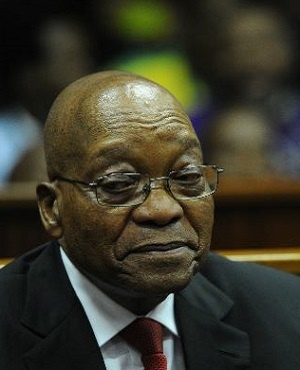
Former president Jacob Zuma appears in the Durban high court on corruption charges (Photo: Felix Dlangamandla, Netwerk24)
Multimedia · User Galleries · News in Pictures Send us your pictures · Send us your stories

Former president Jacob Zuma appears in the Durban high court on corruption charges (Photo: Felix Dlangamandla, Netwerk24)
Multimedia · User Galleries · News in Pictures Send us your pictures · Send us your stories

After news broke that President Jacob Zuma telephoned a senior civil servant, instructing him to help "labafana bakwaGupta" [the Gupta guys], there is a specific independent state institution that should have been prompted to act.
This independent institution is responsible for promoting high standards of professional ethics of more than one million government employees. The institution is established by the Constitution, the only Chapter 10 institution dedicated to overseeing the performance of the public service.
It is the only one tasked with this important task. But this institution, called the Public Service Commission (PSC), has said and done nothing about state capture.
Since allegations of state capture started surfacing, followed by hardcore evidence that South Africa had been mortgaged to foreigners, the PSC hasn’t told the civil servants, or the public in general, how it plans to do its part to protect the integrity of the public service. One wonders whether civil servants are aware of its existence and whether they take it serious enough to report threats they face in executing their obligations.
When media reports revealed that Zuma introduced his son, Duduzane, to Jacinto Rocha, a senior official of the Department of Mineral Resources, as someone who handles money issues for his family, the PSC kept quiet. This despite the fact that the president was clearly giving an instruction to Rocha to give young Zuma deals in a manner not in accordance with the prescripts of professional ethics the PSC is constitutionally tasked to enhance.
The PSC did not tell us whether the president’s conduct was promoting professional ethics and, if not, what it would do about the revelations that have not been denied. Did the PSC interview Themba Maseko, the civil servant who received a call with an instruction to help "labafana bakwaGupta"? What guidance did the commission give Maseko?
When Maseko was pushed out of his job for refusing to advance the interests of the Guptas who wanted government’s advertising for media outlets we now know Zuma had a hand in establishing – and branding – what did the PSC do?
Those who run the commission can argue that it wouldn’t be involved in investigating matters that were already being probed by the then Public Protector Thuli Madonsela. But as an independent institution, it should have offered to help Madonsela on matters that deal with the professional integrity of the public service. It should have done the same with regard to Nkandla, as well as the Estina dairy investigation in the Free State which was subsequently bungled by Busisiwe Mkhwebane, who is struggling to make sense of her role.
In all state capture allegations, including Estina and what Health Minister Aaron Motsoaledi calls "Gupta ATM" Mediosa in the North West, there is a common denominator: politicians instructing civil servants to behave in an unethical manner. Those who refuse the instruction citing their constitutional and professional obligations are sidelined or fired. And those of weaker backbones, who are prepared to be corrupted either for fear of losing their jobs or for the love of the proceeds of corruption, are promoted.
In the Nkandla project civil servants were instructed by politicians to do wrong things. The politicians, particularly Zuma, would later attempt to dodge accountability. In the entire Nkandla saga, what role did the PSC play to reinforce the public service professional ethics as mandated by the Constitution?
There was also the unforgivable deaths of the Life Esidimeni patients. The project was executed by civil servants under the instruction of a politician, Health MEC Qedani Mahlangu. What was the PSC's intervention?
Why didn’t it appear in the arbitration hearings to help arbitrator Justice Dikgang Moseneke and the families of the deceased understand what kind of civil servants were Drs Barney Selebano and Makgabo Manamela, the executors of the deadly scheme?
If the PSC were involved in all these cases to stop the collapse of public service ethics, why has it not told the public about it? Does it operate in secret?
The PSC has a far-reaching mandate. Section 196 of the Constitution says the commission has, among its duties, to promote the values and principles set out in section 195 governing the entire public service.
The values include high standards of professional ethics, efficient and effective use of state resources, impartiality, fairness, equity and the absence of bias in providing services, transparency and representivity. To be able to promote these values, the PSC has the powers to investigate, monitor and evaluate the organisation, administration and personnel practices of the public service. It is also entitled to take remedial actions. As we now know from the Constitutional Court ruling on Nkandla, remedial action of independent state institutions cannot be ignored.
In July 2007, the Kader Asmal ad-hoc committee on the review of independent state institutions recommended that the PSC should play an advocacy role and actively promote its work. Clearly no one paid attention to the recommendations that were submitted to Parliament.
The consequence of ignoring the recommendations is that the PSC is not there when it is needed most. You would be forgiven for believing that the only institutions meant to advance ethical standards in the public service are the Auditor-General and the Public Protector – of course, until Mkhwebane took over from Madonsela. Yet, the PSC exists. Taxpayers are funding its operations. It is unable to perform its constitutional obligations.
- Mkhabela is a political analyst with the Department of Political Sciences at the University of South Africa.
Disclaimer: News24 encourages freedom of speech and the expression of diverse views. The views of columnists published on News24 are therefore their own and do not necessarily represent the views of News24.